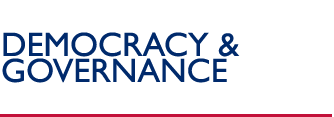Types of Anti-Corruption Programs
USAID has developed a wide range of programs for fighting corruption, often in response to local environments and problems and to specific windows of opportunity within a region or country. Most anti-corruption programs fall into a few major categories. The following is a brief discussion of those categories and the kinds of programs that comprise each.
Fiscal/Customs
USAID efforts in the area of fiscal and tax reforms include a number of large-scale reform and structural adjustment projects. They include initiatives to revamp tax regimes, including collection and reporting systems. Customs reform and budget reform projects also fall in this category.
Civil Society Programs
USAID has long recognized the key role of civil society in creating pressure for reform on governments and in ensuring that the resulting changes are sustainable. Civil society programs constitute the single largest segment of specifically focused on reducing corruption. These varied programs are designed to increase public awareness through media and civic education, to promote involvement and participation of citizens and to encourage civil society oversight of various bodies of government ranging from city councils to national parliaments.
Civil society programs include efforts to promote a free and independent media, to improve the quality of investigative reporting and to pressure government to implement freedom of information legislation. They strengthen local NGOs and citizens' groups, empowering them to become the critical constituencies for reform.
 Local Government and Decentralization
Local Government and Decentralization
USAID programs assist national governments deal with the complex and politically sensitive challenges they face as they attempt to decentralize both government authority and responsibility. Most of these programs focus on budget reform and financial management matters focusing on inter-governmental issues.
USAID programs support transparent and accountable local government in the same way they do at the national level. While many similar approaches are used, including civil society programs, freedom of information and procurement reform, much of the emphasis at the sub-national level is on capacity building. This includes assistance with improving service delivery, budget, financial management and audit capacity development and increasing citizen voice in local government. Many local government programs also contain explicit anti-corruption efforts.
Financial Sector
Financial sector programs focus mainly on reform and strengthening of banks and banking regulation. They also address the establishment of efficient and transparent capital markets and to availability of microfinance and other forms of credit. Strategies to prevent money laundering are also financial sector programs.
Rule of Law
Programs to improve the justice sector in host countries have long been key to democracy and governance strategies since they are a necessary pre-requisite for success in other types of anti-corruption programming. Many of these programs, such as legal or judicial reforms, court administration improvements, prosecutor training and money laundering projects contribute to a government's ability to enforce anti-corruption efforts. Others, such as judicial ethics programs, judicial and prosecutorial training on corruption, and the
establishment of judicial review bodies target corruption directly.
Financial Management
USAID financial management includes institutional strengthening programs that assist Ministries of Finance, programs to strengthen legislative oversight of the budget and financial management process and civil society budget oversight efforts. Many of these programs involve the design and implementation of effective treasury systems and integrated financial management systems. The strengthening of the audit and internal control functions of government, procurement reform and support for Supreme Audit Institutions are also key initiatives for government reform.
Other Programs
Other corruption-fighting efforts include media programs that seek to strengthen the independence and professionalism of the sector and freedom of information initiatives. Procurement reform and e-procurement programs, efforts to increase legislative capacity and oversight and a number of corporate governance strategies are additional examples.
Back to Anti-corruption Index
Programs that Strengthen the Anti-Corruption Environment
Typology Chart
Back to Top ^
|


